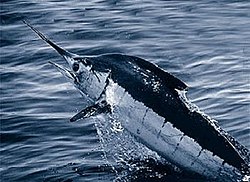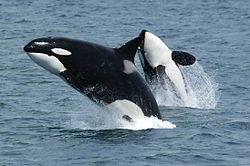Bioaccumulation is the gradual accumulation of substances, such as pesticides or other chemicals, in an organism. Bioaccumulation occurs when an organism...
20 KB (2,276 words) - 20:52, 22 May 2025
transport, which allows them to travel far from their source, and bioaccumulation, which reconcentrates these chemical compounds to potentially dangerous...
43 KB (5,655 words) - 08:38, 16 June 2025
because of their contributions to ozone depletion, global warming, bioaccumulation, and toxicity. The area of organofluorine chemistry often requires...
42 KB (4,548 words) - 04:32, 3 June 2025
Creosote (section Bioaccumulation)
effects. Bioaccumulation is the process by which an organism takes in chemicals through ingestion, exposure, and inhalation. Bioaccumulation is broken...
96 KB (10,410 words) - 06:04, 28 June 2025
Triclosan (section Bioaccumulation)
which potentially endangers marine organisms and may lead to further bioaccumulation. Ozone is considered to be an effective tool for removing triclosan...
61 KB (6,614 words) - 00:40, 16 June 2025
Mesopelagic zone (section Bioaccumulation)
approximately 200 fish sampled in the North Atlantic had consumed plastic. Bioaccumulation (a buildup of a certain substance in the adipose tissue) and biomagnification...
50 KB (6,021 words) - 06:18, 23 May 2025
Parabens are organic compounds that are commonly used as preservatives in cosmetic and pharmaceutical products. They are esters of parahydroxybenzoic acid...
19 KB (2,325 words) - 21:48, 29 May 2025
Ciguatoxin (section Bioaccumulation)
Ciguatoxins are a class of toxic polycyclic polyethers found in fish that cause ciguatera. There are several different chemicals in this class. "CTX" is...
4 KB (471 words) - 15:17, 18 September 2024
nanoplastics (MNPs) are ingestion, inhalation, and dermal contact, with bioaccumulation varying based on particle size, composition, and physicochemical characteristics...
61 KB (6,322 words) - 03:54, 1 July 2025
interchangeably with "bioaccumulation", an important distinction is drawn between the two, and with bioconcentration. Bioaccumulation occurs within a trophic...
11 KB (1,284 words) - 01:18, 10 June 2025
Because of these factors PBTs have been observed to have a high order of bioaccumulation and biomagnification, very long retention times in various media, and...
22 KB (3,061 words) - 12:46, 11 April 2025
; Cheetham, A. K.; Grey, C. P. & Skarnulis, A. J. (1992). "Uranium bioaccumulation by a Citrobacter sp. as a result of enzymically mediated growth of...
110 KB (12,420 words) - 00:06, 26 May 2025
nontarget organisms. TBT toxicity can lead to biomagnification or bioaccumulation within such nontarget organisms like invertebrates, vertebrates, and...
25 KB (3,039 words) - 19:09, 23 May 2025
caterpillars, and termites. It is not highly toxic to mammals, but bioaccumulation may be a concern. It has a low level of toxicity to birds and moderate...
3 KB (152 words) - 18:09, 7 June 2025
Atlantic blue marlin (section Bioaccumulation)
known to accumulate in the Atlantic blue marlin, a process known as bioaccumulation. In 2017, the Texas Parks and Wildlife Department issued a consumption...
28 KB (3,233 words) - 09:19, 27 May 2025
considered water-cleaning ecosystem engineers. They are also important in bioaccumulation and, as a result, as indicator organisms. Filter feeders can be sessile...
28 KB (3,348 words) - 14:36, 25 May 2025
assess bioaccumulation and bioconcentration. These include: octanol-water partition coefficients (KOW), bioconcentration factors (BCF), bioaccumulation factors...
16 KB (1,887 words) - 17:00, 26 November 2024
cadmium sulfide (CdS). It is used for its fluorescent properties. Bioaccumulation of this chemical may occur along the food chain, for example in plants...
3 KB (345 words) - 21:40, 21 December 2023
are, however, so poorly soluble that this hinders their bioaccumulation. Bioaccumulation is followed by biomagnification. Lipid-soluble compounds are...
87 KB (10,771 words) - 06:33, 2 June 2025
PFAS (section Bioaccumulation and biomagnification)
the food web Bioaccumulation controls internal concentrations of pollutants, including PFAS, in individual organisms. When bioaccumulation is looked at...
170 KB (17,630 words) - 03:19, 30 June 2025
organomercury compound. This element is known to bioaccumulate in humans, so bioaccumulation in seafood carries over into human populations, where it can result...
75 KB (7,442 words) - 06:05, 15 June 2025
can take in plastic pollutants through biomagnification and bioaccumulation. Bioaccumulation is defined as the uptake of chemicals from the environment...
34 KB (4,039 words) - 10:50, 24 May 2025
Pacific Gyre San Francisco Estuary tide pool Processes Ascendency Bioaccumulation Cascade effect Climax community Competitive exclusion principle Consumer–resource...
133 KB (13,577 words) - 06:22, 28 June 2025
Piertney, Stuart B.; Fujii, Toyonobu; Zhang, Zulin (13 February 2017). "Bioaccumulation of persistent organic pollutants in the deepest ocean fauna". Nature...
34 KB (3,481 words) - 03:08, 19 June 2025
Agaricus abruptibulbus is a species of mushroom in the genus Agaricus. It is commonly known as the abruptly-bulbous agaricus or the flat-bulb mushroom...
14 KB (1,245 words) - 17:58, 21 May 2025
barbiturates have half-lives of a day or more, and subsequently result in bioaccumulation of the drug in the system. The therapeutic and recreational effects...
44 KB (4,716 words) - 19:40, 7 June 2025
trophic levels, the orca is particularly at risk of poisoning from bioaccumulation of toxins, including Polychlorinated biphenyls (PCBs). European harbour...
145 KB (14,938 words) - 19:00, 30 June 2025
Polychlorinated naphthalene (section Bioaccumulation)
Polychlorinated naphthalene (PCN) are the products obtained upon treatment of naphthalene with chlorine. The generic chemical formula is C10H8−(m+n)Cl(m+n)...
17 KB (905 words) - 17:16, 22 December 2024
stepping up environmental regulations (see, for instance, testing for bioaccumulation in the REACH proposal).[citation needed] Example: Development of quantitative...
2 KB (172 words) - 18:00, 20 July 2017
target molecules, forming potent bactericides, but methylmercury's bioaccumulation and ultimate toxicity has led to it being largely abandoned in favor...
17 KB (1,480 words) - 10:25, 24 June 2025





















